PRINCETON, NJ -- Americans who live in the Western part of the United States are much less likely to believe in God than are those living elsewhere, particularly in the South, where belief in God is highest.
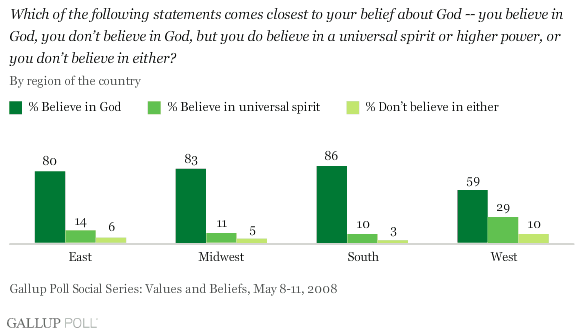
There are a number of ways to ask about belief in God. Gallup's annual Values and Beliefs poll, conducted May 8-11, used a question structure that gave Americans three choices concerning their belief: a) You believe in God, b) You don't believe in God, but you do believe in a universal spirit or higher power, or c) You don't believe in either. The inclusion of the middle alternative has the overall impact of lowering the percentage of those interviewed who say straight-out that they believe in God.
Gallup has asked this question only four times. The trend shows a decrease in the percentage choosing the "belief in God" alternative compared to the initial asking in December 1999. The fact that this baseline reading was obtained in the weeks before Christmas may partially explain why the reading was higher that year than in 2004, 2007, and this year.
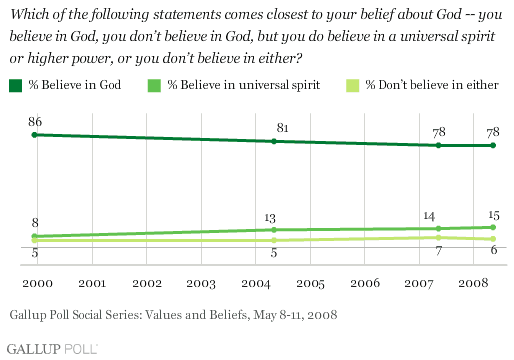
Clearly, as seen previously, Americans living in the West are significantly less likely to choose the first "belief in God" alternative than are those living in any of the other three regions of the country. Westerners are much more inclined to believe in a universal spirit or higher power than are Americans from the East, Midwest, or South. One out of 10 Westerners say they don't believe in either.
By age, the major differentiation in belief in God is between seniors and those younger than 65. Eighty-eight percent of the older group professes belief in God, compared to percentages between 74% and 77% for those in the three younger age groups. It is well-known that older Americans are the most religious. The interesting fact here, though, is the relatively high percentage of belief in God among those 18 to 29 -- usually the least religious group.
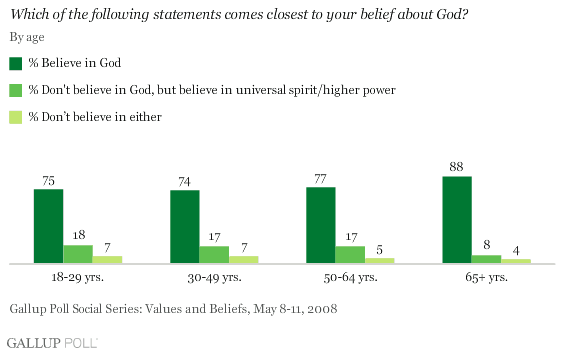
The major difference by educational level is between those with a high school diploma or less and those with higher education levels. While 88% of Americans with a high school education or less profess a belief in God, just more than 7 out of 10 Americans with postgraduate degrees believe in God. Another 19% of this highly educated group professes belief in a universal spirit or higher power.
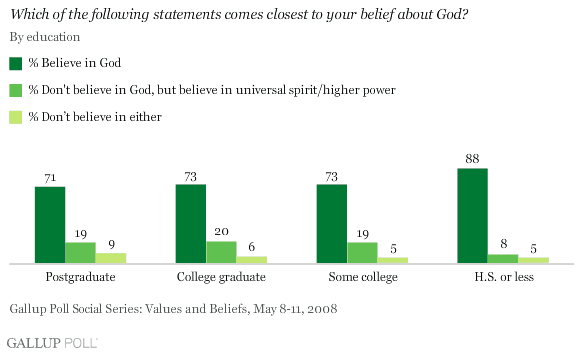
It is well-known that Republicans are more religious than are Democrats (or independents). These data confirm that finding. Eighty-nine percent of Republicans believe in God, compared to 77% of Democrats and an even lower 70% of independents.
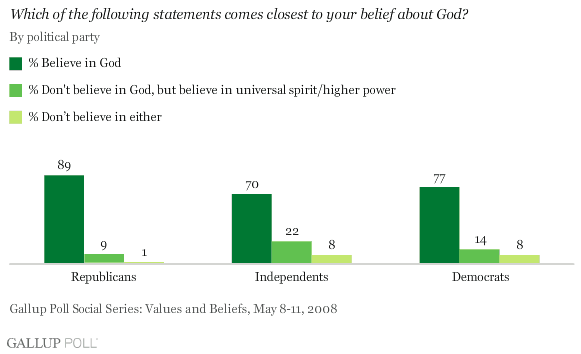
Even among Americans who say they have no religious identity (that is, have no religion or denomination with which they identify), only 30% say they do not believe in either God or a universal spirit/higher power. The majority say they believe in the latter, with just 15% believing in God. Protestants and other non-Catholic Christians have a slightly higher percentage of belief in God than do Catholics, and for both groups, the percentage is much higher than for those who profess to identify with a non-Christian religion.
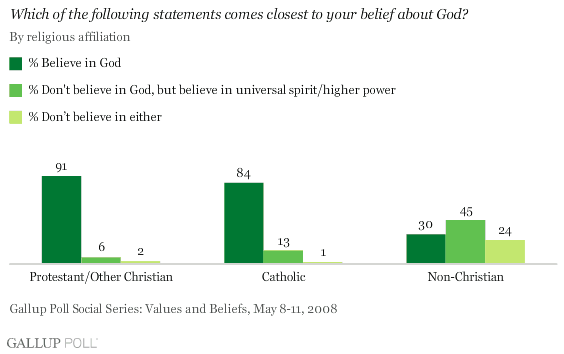
Summary
Overall, just fewer than 8 out of 10 Americans profess belief in God, while the majority of the rest say they do not believe in God but do believe in a higher spirit or universal power. Only 6% of Americans say they simply do not believe in either. The fact that, compared with other regions, those from the Western United States have the lowest likelihood of believing in God does not come as a total surprise given other data showing that the West has a lower level of religiosity overall. Still, the contrast between Westerners and those from other regions reflected in these data is fairly substantial.
The differences in belief in God by education and age confirm findings relating to these demographic variables and church attendance and the importance of religion. Generally, however, belief in God is at the 70% or higher level among even the traditionally least religious subgroups, such as those younger than 30.
Survey Methods
Results are based on telephone interviews with 1,017 national adults, aged 18 and older, conducted May 8-11, 2008. For results based on the total sample of national adults, one can say with 95% confidence that the maximum margin of sampling error is ±3 percentage points.
Interviews are conducted with respondents on land-line telephones (for respondents with a land-line telephone) and cellular phones (for respondents who are cell-phone only).
In addition to sampling error, question wording and practical difficulties in conducting surveys can introduce error or bias into the findings of public opinion polls.
To provide feedback or suggestions about how to improve Gallup.com, please e-mail feedback@gallup.com.
